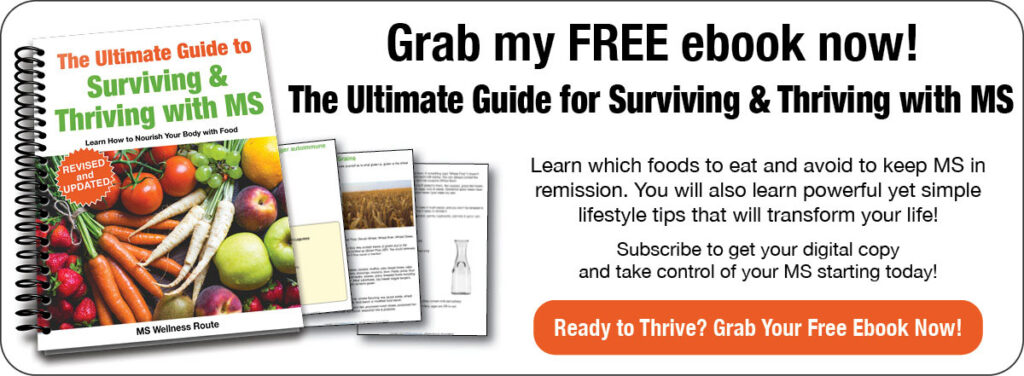Last Updated on September 6, 2024 by Cathy

Researchers still don’t know what exactly causes multiple sclerosis (MS) but “it is certainly a multifactorial disease.” By living an anti-inflammatory lifestyle it is possible to stop chronic inflammation and MS.
Researchers believe a person is born predisposed and the environment triggers it. Vitamin D deficiency, Epstein-Barr virus, and smoking are well-established environmental risk factors. MS is an inflammatory autoimmune disease of the central nervous system.
According to the Cleveland Clinic Center for Continuing Education:
MS is a chronic inflammatory, demyelinating, and neurodegenerative disorder of the central nervous system (CNS) that affects the white and grey matter of the brain, spinal cord, and optic nerve.
Living with MS
Those are all interesting facts but when you are living with MS it doesn’t really matter. When I was first diagnosed with MS I didn’t know anyone who had MS. I wasn’t even sure what MS was, I had to look it up in the dictionary (this was before the internet). I felt like I was the only one in the world that had MS.
The fact is, MANY people have MS. It is estimated nearly 1 million people in the United States and 2.5 million worldwide are living with MS. This is a huge jump, it more than doubled from the last report back in 1975. It’s predicted the numbers are even higher due to poor tracking.
Get a FREE Gut Health Tracker
For most people, it is an invisible disease. They may look fine on the outside. But on the inside, they are struggling with chronic fatigue, numbness, bladder issues, heat intolerance, the list goes on and on.
It was many years before I told everyone I had MS, other than my family and close friends. I was worried people would treat me differently and I would lose my job. The only reason I finally told everyone was due to a flare where I could not hide it any longer.
Fortunately, researchers have learned a lot in the past decade. They may not have found the exact cause. But there are things YOU can do to slow and even stop the progression and that is by removing inflammation.
Removing Chronic Inflammation
Many things contribute to chronic inflammation including dietary choices, exposure to toxins, and stress. As you are constantly exposed to inflammation it places excessive stress on your immune system.
Chronic inflammation is very harmful to your body. Your body keeps sending signals. But we like to take a quick fix, like an aspirin or antacid, instead of addressing the root problem. Over time, organs, tissues, and cells are damaged leading to autoimmune diseases.
Signs of chronic inflammation:
- Acne
- Anxiety
- Bloating
- Body pain
- Brain fog
- Chronic fatigue
- Constipation
- Depression
- Diarrhea
- Insomnia
- Mood disorders
- Skin rashes
Fortunately, we have control over some of these causes of inflammation. Many of these factors you can remove just by changing your diet and lifestyle. Learning which foods are anti-inflammatory to provide your body with healthy fats, fiber, vitamins, and minerals is very beneficial for long-term health.
Quick Links You May Be Interested In:
Foods to Avoid for MS
Foods to Avoid for Gut Health
Heal Your Leaky Gut Fast and Start Feeling Better
200+ Symptoms of Multiple Sclerosis
Inflammatory Foods to Avoid
If you are eating the Standard American Diet (SAD) you are eating an extremely inflammatory diet. The SAD is full of processed foods, refined sugar, and unhealthy fats. It is low in fiber from fruits and vegetables and probiotics from fermented foods – also vitamins, minerals, and enzymes.
Foods that cause inflammation:
- Artificial sweeteners
- Conventionally raised meat and dairy
- Gluten
- Farm-raised fish
- Processed meats
- Refined carbohydrates (breakfast cereals, white flour, white rice, etc.)
- Refined sugar
- Canola oil, it’s mostly a genetically modified organism (GMO)
Foods That Fight Inflammation

A diet that consists of anti-inflammatory foods can help decrease inflammation. Food such as fish, fruits and vegetables. These foods include antioxidants which are protective against damaging agents. Plant-based foods are especially beneficial since they’re packed with antioxidants.
Don’t look at this as a restrictive diet. Instead, look at all the foods that can help you combat chronic inflammation. Here are some of the best anti-inflammatory foods:
- Berries – Including blackberries, blueberries, raspberries, and strawberries. They are very high in antioxidants. Plus, they make a great alternative to sugar when you are craving something sweet.
- Cruciferous vegetables – These include bok choy, broccoli, Brussels sprouts, cabbage, cauliflower, and radishes. They are full of vitamins, minerals, and fiber that are important for your health.
- Fish – Oily fish like mackerel, salmon, sardines, or trout are high in omega-3 fatty acids. Omega-3s are the foundation of brain and nerve tissue.
- Garlic – Garlic is a powerhouse; you should eat it daily. It fights chronic inflammation, bacterial overgrowth, and yeast overgrowth, and helps prevent some cancers.
- Vitamin C – Foods high in vitamin C are broccoli, Brussels sprouts, grapefruit, oranges, papayas, pineapple, and strawberries. These antioxidants strengthen the immune system and protect it from free-radical damage.
- Vitamin E – Foods high in vitamin E are almonds, avocados, butternut squash, spinach, and sunflower seeds. Vitamin E helps prevent oxidative stress and heart disease and enhances the immune system.
Other anti-inflammatory foods include dark chocolate, flaxseeds, ginger, green peppers, green tea, olive oil, and turmeric. Add these foods to your diet as often as possible. They help reduce inflammation throughout your body.

Stop Chronic Inflammation
Exercise – As little as 20 minutes of light exercising each day will help remove inflammation. The best exercises for MS are walking, swimming, yoga, tai chi, stretching, and massaging, and the one highly recommended is OptimalBody Personal Fitness.
Sleep – Couldn’t we all use a little more sleep? Unfortunately, fatigue is one of the most common symptoms of MS. To help, get plenty of sunshine during the day, exercise, limit caffeine, go to bed at the same time each night, and avoid electronics an hour before bedtime.
Stress – Chronic stress is very toxic to your body. Both emotional and mental stress release the “fight or flight” response in the central nervous system. It slows down your digestive system to increase more energy during dangerous threats.
You can’t remove all stress but you can learn different techniques to manage stress. Go for a walk, listen to peaceful music, do deep breathing, meditate, talk to a friend, and laugh.
Vitamin D – Low vitamin D levels are associated with MS and other chronic diseases. It not only plays an important role in bone health. It also has significant inflammatory benefits. Only a few foods have vitamin D such as fatty fish, beef liver, and egg yolks. It’s best to get it from the sun and in a supplement.
Other anti-inflammatory techniques are bentonite clay, deep breathing exercises, dry brushing, Epsom salt baths, infrared sauna, grounding, and sweating. Practice one or more of these each day to help lower the inflammation in your body.
You got this!
Gut Health Tracker
Get the password for my library including the Gut Health Tracker here by filling out this form:
Want to remember this? Pin it to your favorite Pinterest board!


How to Stop Chronic Inflammation






Great tips, and I like that you’ve included plenty of easier to manage ways of improving your defences to fight inflammation through making sure you get enough sources of things like Vitamin C, and checking Vitamin D levels (these are often not checked routinely yet deficiency can have huge effects). Fab post!
Thank you for your kind words! 😊